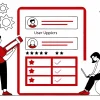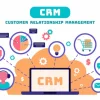
What Is Customer Engagement?
Customer engagement is the connection between a brand and its customers. It’s about creating valuable experiences that keep people coming back. Engaged customers are more loyal and often leave useful customer feedback, improving your offerings.
Why Is Customer Engagement Important?
Building engagement fosters trust and loyalty. It helps companies improve retention rates and refine customer feedback management strategies. Happy customers advocate for your brand, amplifying your reach.
Key Benefits of Strong Customer Engagement
Strong customer engagement is crucial for building lasting relationships, enhancing customer satisfaction, and driving business growth. When customers are actively engaged, the benefits extend beyond just sales and retention.
1. Increased Loyalty
Engaged customers feel more valued, which increases their loyalty to a brand. They are more likely to stay with a company, recommend it to others, and choose its products or services over competitors, boosting long-term retention and reducing churn.
2. Higher Sales
When customers are engaged and satisfied, they tend to make repeat purchases and explore additional products or services offered by the business. This leads to increased sales and more frequent transactions, directly impacting a company’s revenue.
3. Better Feedback
Engaged customers are more likely to provide valuable feedback, offering insights into their needs, preferences, and experiences. This feedback helps businesses understand what works well and where improvements are needed, guiding them to refine their offerings and enhance customer satisfaction.
4. Stronger Brand Advocacy
Engaged customers often become brand advocates, sharing positive experiences through word-of-mouth or social media. Their recommendations can bring in new customers and increase brand visibility, creating a cycle of growth and trust.
Types of Customer Engagement
Customer engagement comes in various forms, each playing a crucial role in fostering deeper relationships between businesses and their customers. Understanding the different types can help businesses tailor their strategies to maximize customer loyalty and satisfaction.
1. Emotional Engagement
Emotional engagement focuses on building a deep connection between the customer and the brand based on shared values, beliefs, or experiences. This type of engagement goes beyond transactions and fosters a sense of belonging.
2. Social Engagement
Social engagement refers to interactions that occur on social media platforms and other online communities. These engagements are vital for building trust, offering customer support, and keeping customers informed.
3. Transactional Engagement
Transactional engagement centers on creating value through loyalty programs, discounts, special offers, and rewards for purchases. These programs incentivize customers to return and engage with the brand more frequently.
How to Measure Customer Engagement?
Measuring customer engagement is essential for understanding how well a business is connecting with its customers and how those interactions impact long-term success. Tracking the right metrics can provide valuable insights and guide strategies for improvement.
1. Net Promoter Score (NPS)
The Net Promoter Score (NPS) is a key metric for gauging customer loyalty. It measures the likelihood of customers recommending a business to others based on their experiences.
A high NPS indicates that customers are emotionally connected to the brand and are likely to remain loyal, while a low score suggests that there may be areas for improvement.
2. Retention Rates
Retention rates are an essential metric for understanding the effectiveness of customer engagement efforts. High retention rates indicate that a business is succeeding in keeping customers satisfied and loyal over time.
3. Social Media Interactions
Social media interactions, such as likes, comments, shares, and mentions, are strong indicators of customer engagement. The more customers engage with a brand on social media platforms, the deeper their connection with the brand is likely to be.
4. Customer Satisfaction (CSAT) Scores
CSAT surveys are a simple yet effective way to measure customer satisfaction at specific touchpoints. By asking customers to rate their experience after interactions, purchases, or services, businesses can get a clear picture of how well they are meeting customer expectations and where improvements might be necessary.
Strategies to Improve Customer Engagement
Improving customer engagement is essential for building stronger relationships and fostering loyalty. Here are some effective strategies to help businesses enhance customer interactions and create lasting connections.
1. Personalization
Personalization is a powerful tool in customer engagement. Tailored messages, offers, and product recommendations make customers feel valued and understood. By analyzing customer data, businesses can create personalized experiences that cater to individual preferences, past behaviors, and purchasing history.
2. Focus on Customer Feedback Management
Listening to customer feedback and taking action based on it is a crucial part of building trust and strengthening customer relationships. By using tools to gather, analyze, and implement feedback effectively, businesses can make data-driven decisions that enhance their products, services, and customer experience.
3. Leverage Social Media
Social media is an essential platform for engaging with customers in real-time. Responding promptly to comments, messages, and reviews helps build rapport and show that the business values its audience.
4. Consistent Communication
Maintaining consistent communication with customers is vital for keeping them engaged. Regular emails, newsletters, and app notifications can help businesses stay top-of-mind, share important updates, and provide relevant content or offers.
5. Loyalty Programs
Loyalty programs are an excellent way to incentivize repeat business and reward long-term customers. Offering discounts, special perks, or exclusive access to products or events for repeat purchases fosters a sense of appreciation and encourages customers to continue engaging with the brand.
Role of Technology in Customer Engagement
Technology plays a critical role in transforming how businesses engage with their customers. With the rise of digital tools and platforms, companies can provide more personalized, efficient, and data-driven customer experiences. Here’s how various technological advancements are revolutionizing customer engagement:
1. CRM Tools
Customer Relationship Management (CRM) software is essential for managing and streamlining communication with customers. CRM tools help businesses keep track of customer interactions, preferences, purchase history, and support requests.
2. Chatbots and AI
Chatbots and Artificial Intelligence (AI) have become integral parts of customer service and engagement strategies. These technologies offer instant support to customers, answering queries, resolving issues, and guiding them through product or service options at any time of the day.
3. Data Analytics
Data analytics allows businesses to track trends, monitor customer behaviors, and analyze feedback to understand what customers want. By using data from social media, website interactions, and purchase patterns, businesses can gain valuable insights into customer preferences, pain points, and emerging trends.
Common Mistakes to Avoid in Customer Engagement
Effective customer engagement is crucial for building strong, lasting relationships. However, businesses often make several common mistakes that can hinder their engagement efforts and negatively impact customer satisfaction. Here’s a closer look at some of the most prevalent errors to avoid:
1. Ignoring Customer Feedback
One of the most significant mistakes businesses make is disregarding customer feedback. When customers take the time to share their opinions, whether positive or negative, it’s essential to listen and act on their suggestions.
2. Failing to Personalize Interactions
Customers expect personalized experiences that cater to their unique needs and preferences. Failing to personalize interactions can make customers feel like they’re just another number, leading to disengagement.
3. Overloading Customers with Messages
While consistent communication is important, overloading customers with too many messages can have the opposite effect. Bombarding customers with excessive emails, notifications, or promotional content can overwhelm them and lead to disengagement or unsubscribes.
4. Neglecting to Resolve Complaints Quickly
When customers voice complaints, how quickly and effectively those issues are resolved is critical to maintaining a positive relationship. Neglecting to address complaints promptly can lead to frustration and negative reviews, damaging a business’s reputation.
For more insights, read our customer feedback management article.
Conclusion
Customer engagement: Everything you need to know” emphasizes the importance of building strong relationships with your audience. By leveraging customer feedback and implementing effective strategies, you can foster loyalty, boost retention, and achieve long-term success. Start today, and watch your business thrive.
Frequently Asked Questions?
What Is Customer Engagement?
Customer engagement refers to the ongoing interactions between a business and its customers, aimed at building strong relationships, improving satisfaction, and fostering loyalty through personalized experiences.
How Can I Improve Customer Engagement?
To improve customer engagement, personalize interactions, actively listen to feedback, maintain consistent communication, leverage social media, and offer loyalty programs to enhance customer satisfaction and loyalty.
Why Is Customer Feedback Important For Engagement?
Customer feedback is vital for engagement as it provides insights into needs, preferences, and satisfaction, allowing businesses to improve products, services, and customer relationships.
What Tools Help With Customer Feedback Management?
Customer feedback management tools like surveys, CRM software, social listening platforms, and review management tools help collect, analyze, and act on customer feedback effectively.
Enhance Patient Care and NABH Compliance with LazyMonkey
LazyMonkey is your all-in-one solution for improving patient care, retaining more patients, and meeting NABH standards. Our powerful QR-based feedback tool enables you to capture real-time insights from patient feedback, discharge surveys, staff and doctor evaluations, and clinical research, while also streamlining inter-departmental communication.
Transform your healthcare facility today - reach out to us at hello@lazymonkey.in, or request a demo here!
Elevate Your Restaurant Experience with LazyMonkey
LazyMonkey’s QR-based feedback system helps you gather real-time insights from customers, track satisfaction levels, and enhance the dining experience. Get instant feedback on your menu, service, and ambience, and make data-driven improvements to boost repeat customers and reviews.
Improve your restaurant today – reach out to us at hello@lazymonkey.in, or request a demo here!
Empower Student Engagement and Campus Improvement with LazyMonkey
LazyMonkey offers a seamless way to gather student feedback, track satisfaction, and enhance campus life. From course evaluations to dorm feedback, our QR-based solution makes it easy to capture valuable insights and improve student retention.
Upgrade your university experience – contact us at hello@lazymonkey.in, or request a demo here!
Streamline Feedback and Drive Performance Across Your Enterprise/Franchise with LazyMonkey
Whether you manage one or multiple locations, LazyMonkey’s QR-based feedback system helps you gather real-time employee and customer feedback. Improve operational efficiency, track satisfaction, and make data-driven decisions to enhance brand consistency and growth.
Transform your franchise today – reach out to us at hello@lazymonkey.in, or request a demo here!
Enhance Customer Satisfaction and Service Standards in Banking with LazyMonkey
LazyMonkey empowers banks to capture real-time feedback from clients across branches. Improve customer experience, assess service quality, and ensure regulatory compliance with our QR-based solution, helping you retain clients and meet banking standards.
Elevate your bank’s customer care – contact us at hello@lazymonkey.in, or request a demo here!
Boost Customer Engagement and Mall Satisfaction with LazyMonkey
LazyMonkey’s QR-based feedback tool enables you to collect feedback from shoppers, track satisfaction, and enhance the mall experience. Gather insights on store services, cleanliness, and entertainment to create an unmatched customer journey.














